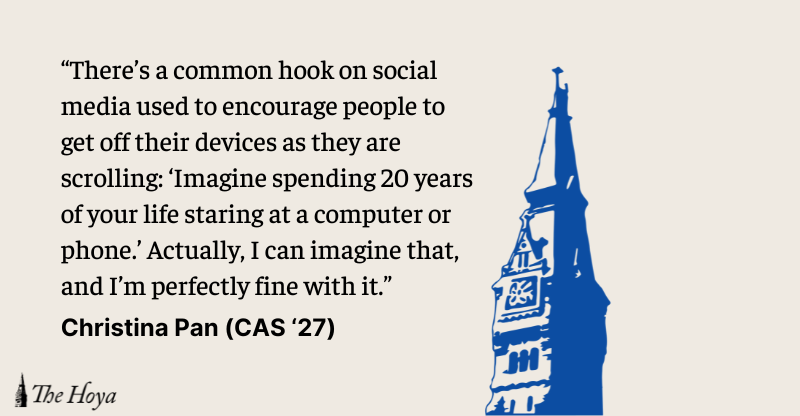
Read any number of articles or talk to any professor and there’s a good chance they’ll tell you the solution to all your problems is to stay off your electronic devices, take some good old handwritten notes and sit outside and enjoy nature.
The main idea of this perspective is to disconnect from the digital world when you’re feeling discontent with real life. The common sentiment is that the pervading problem is modernization: our computers and the “evils” of ChatGPT. The solutions are, seemingly, extra time in nature, unplugging, relaxing and disconnecting.
The ideal of living such a life reflects a romanticized worldview, which is impossible to achieve in practice. While you can choose to emulate the simplicity of a bygone lifestyle, it is impossible to live it past cliche aesthetics. I, for one, love my analog devices and antiques: I am an avid collector of vinyl, vintage clothes and antique books. However, I wouldn’t be able to source them without tools like EBay, Pinterest, Vinted, Yelp and more. My passion for antiques is also merely a simple fascination rather than a genuine desire to exit the digitized lifestyle.
I am not ashamed to admit my screen time comprises a sizable amount of my day, from the three to four hours I spend in class each day and the two or three hours I spend studying after to the extra two hours I spend just enjoying myself. Georgetown University expects all its students to study around 30 hours per week outside of class or at least six hours per three credit course. In addition to time spent on devices during class or for personal enjoyment, this time adds up to around 40+ hours spent on a computer per week.
There’s a common hook on social media used to encourage people to get off their devices as they are scrolling: “Imagine spending 20 years of your life staring at a computer or phone.” Actually, I can imagine that, and I’m perfectly fine with it.
There’s a vast world online which has benefited my life in ways I never would have expected. I started writing for a London-based publication because I emailed a writer who was published in the same journal. I’ve found summer opportunities and jobs through my friends’ Instagram stories, shows by underground artists through TikTok, Louboutins for an insanely low price on Facebook Marketplace and so much more.
We spend so much time staring at screens, but they are not just screens — they are portals which transfer us to rich databases of information and opportunities. While they can certainly detract from our reality, they can enhance it just as well. I wouldn’t have been able to meet so many people or learn from so many opportunities if I hadn’t trusted the digital life.
Sure, too much technology can start to rot your brain. Dependence on technology is inevitable today, but you can choose how to depend on it. Put your phone in a different language. Listen to new artists in different countries and time periods. Learn new ways to improve your life by using technology.
Our real lives are dependent on the digital world, and it is no longer possible to envision university life without it. We are all immersed in this ecosystem and must learn how to use our tools effectively. The solution is not to do away with technology; it is to embrace and trust in the digital life to enhance your real one.
Blanket statements about modernization making everyone less social or more robotic aren’t particularly helpful. This is an all-or-nothing mentality, which does not progress nor have to apply to your life.
You can be immersed in technology for a significant portion of your waking hours and remain a healthy, social and functioning person. Technology, used intentionally, has the unique ability to make people sharper, more connected and more imaginative about how interconnected and advanced life can be.
Christina Pan is a sophomore in the College of Arts & Sciences.